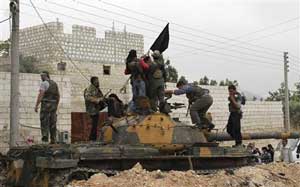Reply To:
Name - Reply Comment
Last Updated : 2024-04-26 02:12:00
 Syrian rebels cast doubt on Monday on prospects for a temporary truce aimed at stemming bloodshed in the 19-month-old conflict, saying it was not clear how an informal ceasefire this week could be implemented.
Syrian rebels cast doubt on Monday on prospects for a temporary truce aimed at stemming bloodshed in the 19-month-old conflict, saying it was not clear how an informal ceasefire this week could be implemented.
Add comment
Comments will be edited (grammar, spelling and slang) and authorized at the discretion of Daily Mirror online. The website also has the right not to publish selected comments.
Reply To:
Name - Reply Comment
US authorities are currently reviewing the manifest of every cargo aboard MV
On March 26, a couple arriving from Thailand was arrested with 88 live animal
According to villagers from Naula-Moragolla out of 105 families 80 can afford
Is the situation in Sri Lanka so grim that locals harbour hope that they coul